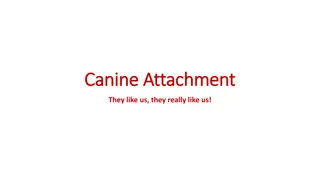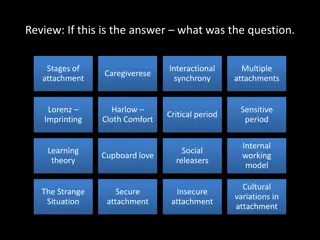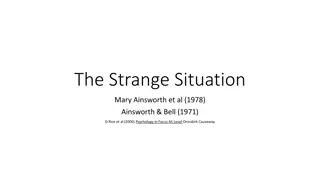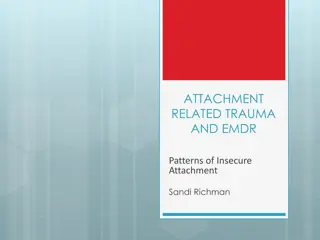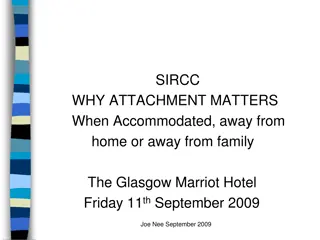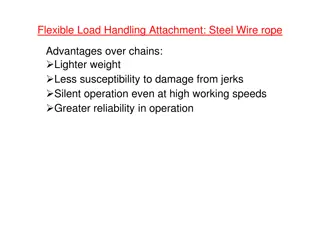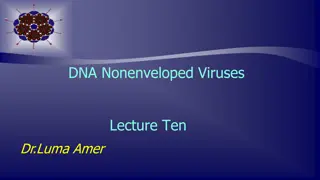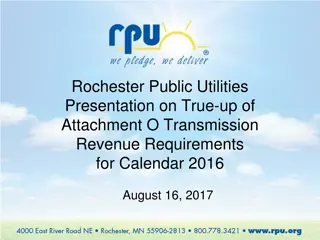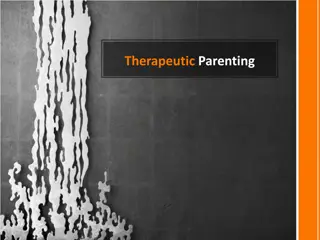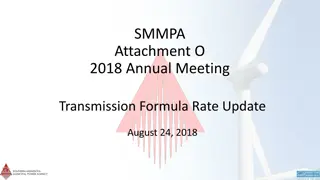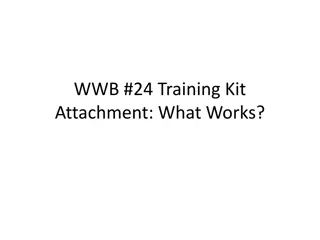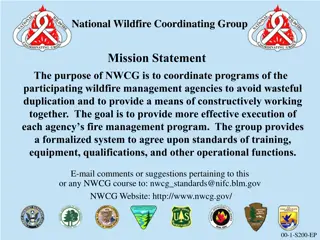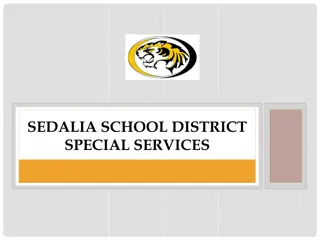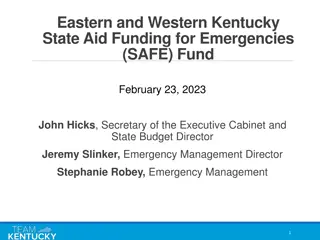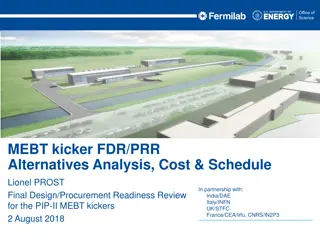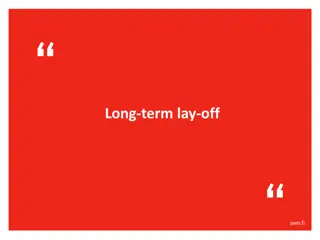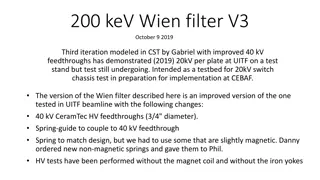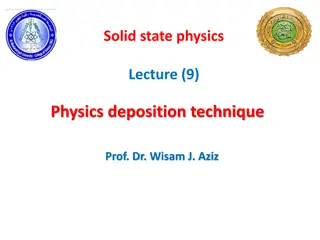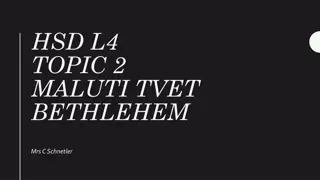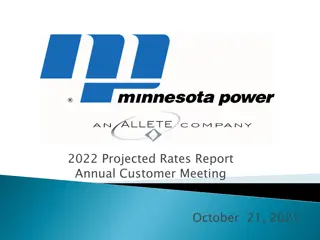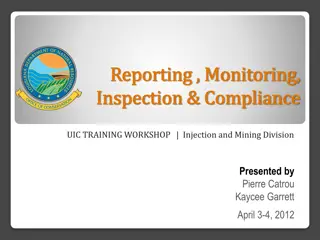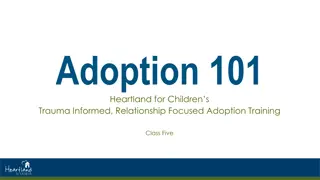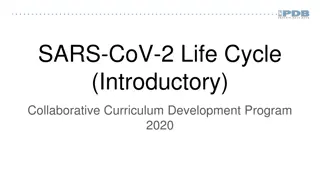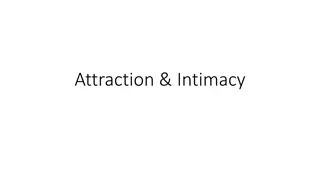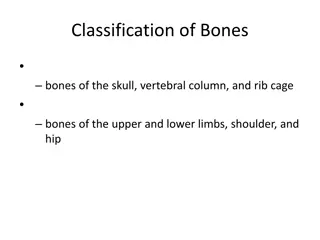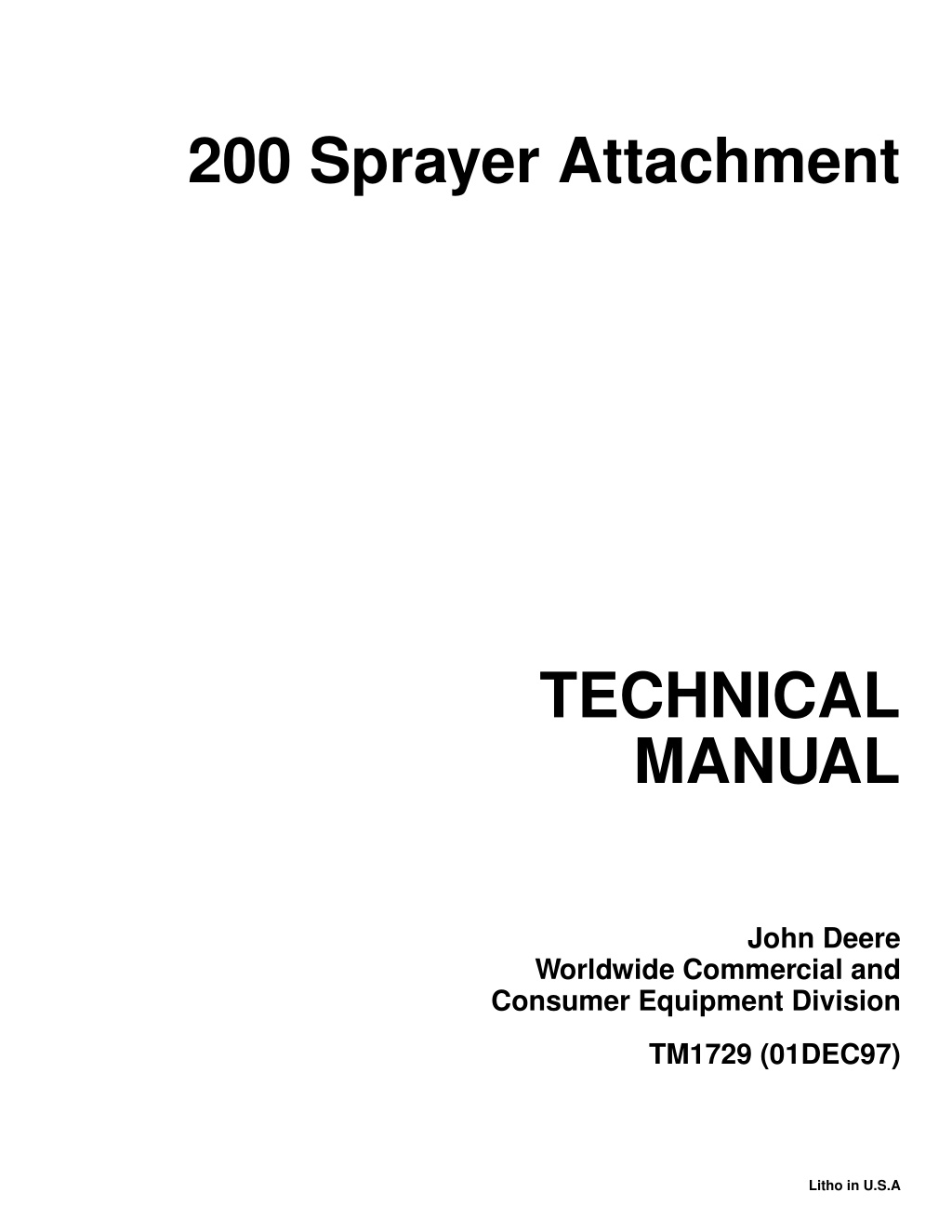
John Deere 200 Sprayer Attachment Service Repair Manual Instant Download
Please open the website below to get the complete manualnn// n
Download Presentation

Please find below an Image/Link to download the presentation.
The content on the website is provided AS IS for your information and personal use only. It may not be sold, licensed, or shared on other websites without obtaining consent from the author. Download presentation by click this link. If you encounter any issues during the download, it is possible that the publisher has removed the file from their server.
E N D
Presentation Transcript
200 Sprayer Attachment TECHNICAL MANUAL John Deere Worldwide Commercial and Consumer Equipment Division TM1729 (01DEC97) Litho in U.S.A
INTRODUCTION This technical manual is written for an experienced technician and contains sections that are specifically for this product. It is a part of a total product support program. Safety Specifications and Information The manual is organized so that all the information on a particular system is kept together. The order of grouping is as follows: Table of Contents Specifications Component Location System Schematic Theory of Operation Troubleshooting Chart Diagnostics Tests & Adjustments Repair Electrical Power Train Note: Depending on the particular section or system being covered, not all of the above groups may be used. Pump Each section will be identified with a symbol rather than a number. The groups and pages within a section will be consecutively numbered. Sprayer System All information, illustrations and specifications in this manual are based on the latest information available at the time of publication. The right is reserved to make changes at any time without notice. We appreciate your input on this manual. To help, there are postage paid post cards included at the back. If you find any errors or want to comment on the layout of the manual please fill out one of the cards and mail it back to us. Miscellaneous COPYRIGHT 1997 JOHN DEERE WORLDWIDE COMMERCIAL AND CONSUMER EQUIPMENT DIVISION Horicon, Wisconsin All rights reserved 1 - 1 11/12/97
https://www.ebooklibonline.com Hello dear friend! Thank you very much for reading. Enter the link into your browser. The full manual is available for immediate download. https://www.ebooklibonline.com
SAFETY RECOGNIZE SAFETY INFORMATION HANDLE FLUIDS SAFELY-AVOID FIRES Be Prepared For Emergencies This is the safety-alert symbol. When you see this symbol on your machine or in this manual, be alert to the potential for personal injury. Follow recommended precautions and safe servicing practices. Understand Signal Words A signal word DANGER, WARNING, or CAUTION is used with the safety-alert symbol. DANGER identifies the most serious hazards. DANGER or WARNING safety signs are located near specific hazards. General precautions are listed on CAUTION safety signs. CAUTION also calls attention to safety messages in this manual. When you work around fuel, do not smoke or work near heaters or other fire hazards. Store flammable fluids away from fire hazards. Do not incinerate or puncture pressurized containers. Make sure machine is clean of trash, grease, and debris. Do not store oily rags; they can ignite and burn spontaneously. Be prepared if a fire starts. Keep a first aid kit and fire extinguisher handy. Keep emergency numbers for doctors, ambulance service, hospital, and fire department near your telephone. REPLACE SAFETY SIGNS Replace missing or damaged safety signs. See the machine operator s manual for correct safety sign placement. 1 - 2 11/12/97
SAFETY USE CARE AROUND HIGH- PRESSURE FLUID LINES USE SAFE SERVICE PROCEDURES Wear Protective Clothing Avoid High-pressure Fluids Wear close fitting clothing and safety equipment appropriate to the job. Prolonged exposure to loud noise can cause impairment or loss of hearing. Wear a suitable hearing protective device such as earmuffs or earplugs to protect against objectionable or uncomfortable loud noises. Operating equipment safely requires the full attention of the operator. Do not wear radio or music headphones while operating machine. Escaping fluid under pressure can penetrate the skin causing serious injury. Avoid injury from escaping fluid under pressure by stopping the engine and relieving pressure in the system before disconnecting or connecting hydraulic or other lines. Tighten all connections before applying pressure. Search for leaks with a piece of cardboard. Protect hands and body from high pressure fluids. If an accident occurs, see a doctor immediately. Any fluid injected into the skin must be surgically removed within a few hours or gangrene may result. Doctors unfamiliar with this type of injury should reference a knowledgeable medical source. Such information is available from Deere & Company Medical Department in Moline, Illinois, U.S.A. Service Machines Safely Avoid Heating Near Pressurized Fluid Lines Tie long hair behind your head. Do not wear a necktie, scarf, loose clothing, or necklace when you work near machine tools or moving parts. If these items were to get caught, severe injury could result. Remove rings and other jewelry to prevent electrical shorts and entanglement in moving parts. Use Proper Tools Use tools appropriate to the work. Makeshift tools and procedures can create safety hazards. Use power tools only to loosen threaded parts and fasteners. For loosening and tightening hardware, use the correct size tools. DO NOT use U.S. measurement tools on metric fasteners. Avoid bodily injury caused by slipping wrenches. Use only service parts meeting John Deere specifications. Flammable spray can be generated by heating near pressurized fluid lines, resulting in severe burns to yourself and bystanders. Do not heat by welding, soldering, or using a torch near pressurized fluid lines or other flammable materials. Pressurized lines can be accidentally cut when heat goes beyond the immediate flame area. 1 - 3 11/12/97
SAFETY Park Machine Safely Using High Pressure Washers Directing pressurized water at electronic/electrical components or connectors, bearings, hydraulic seals, fuel injection pumps or other sensitive parts and components may cause product malfunctions. Reduce pressure and spray at a 45 to 90 degree angle. Illuminate Work Area Safely Illuminate your work area adequately but safely. Use a portable safety light for working inside or under the machine. Make sure the bulb is enclosed by a wire cage. The hot filament of an accidentally broken bulb can ignite spilled fuel or oil. Before working on the machine: 1. Lower all equipment to the ground. 2. Stop the engine and remove the key. 3. Disconnect the battery ground strap. 4. Hang a DO NOT OPERATE tag in operator station. Remove Paint Before Welding Or Heating Avoid potentially toxic fumes and dust. Hazardous fumes can be generated when paint is heated by welding, soldering, or using a torch. Do all work outside or in a well ventilated area. Dispose of paint and solvent properly. Remove paint before welding or heating: If you sand or grind paint, avoid breathing the dust. Wear an approved respirator. If you use solvent or paint stripper, remove stripper with soap and water before welding. Remove solvent or paint stripper containers and other flammable material from area. Allow fumes to disperse at least 15 minutes before welding or heating. Support Machine Properly And Use Proper Lifting Equipment Avoid Harmful Asbestos Dust Avoid breathing dust that may be generated when handling components containing asbestos fibers. Inhaled asbestos fibers may cause lung cancer. Components in products that may contain asbestos fibers are brake pads, brake band and lining assemblies, clutch plates, and some gaskets. The asbestos used in these components is usually found in a resin or sealed in some way. Normal handling is not hazardous as long as airborne dust containing asbestos is not generated. Avoid creating dust. Never use compressed air for cleaning. Avoid brushing containing asbestos. When servicing, wear an approved respirator. A special vacuum cleaner is recommended to clean asbestos. If not available, apply a mist of oil or water on the material containing asbestos. Keep bystanders away from the area. If you must work on a lifted machine or attachment, securely support the machine or attachment. Do not support the machine on cinder blocks, hollow tiles, or props that may crumble under continuous load. Do not work under a machine that is supported solely by a jack. Follow recommended procedures in this manual. Lifting heavy components incorrectly can cause severe injury or machine damage. Follow recommended procedure for removal and installation of components in the manual. or grinding material Work In Clean Area Before starting a job: 1. Clean work area and machine. 2. Make sure you have all necessary tools to do your job. 3. Have the right parts on hand. 4. Read all instructions thoroughly; do not attempt shortcuts. 1 - 4 11/12/97
SAFETY AVOID INJURY FROM ROTATING BLADES, AUGERS AND PTO SHAFTS Dispose of Waste Properly Improperly disposing of waste can threaten the environment and ecology. Potentially harmful waste used with John Deere equipment include such items as oil, fuel, coolant, brake fluid, filters, and batteries. Use leakproof containers when draining fluids. Do not use food or beverage containers that may mislead someone into drinking from them. Do not pour waste onto the ground, down a drain, or into any water source. Inquire on the proper way to recycle or dispose of waste from your local environmental or recycling center, or from your John Deere dealer. LIVE WITH SAFETY Keep hands and feet away while machine is running. Shut off power to service, lubricate or remove mower blades, augers or PTO shafts. HANDLE CHEMICAL PRODUCTS SAFELY Before returning machine to customer, make sure machine is functioning properly, especially the safety systems. Install all guards and shields. Direct exposure to hazardous chemicals can cause serious injury. Potentially hazardous chemicals used with John Deere equipment include such items as lubricants, coolants, paints, and adhesives. A Material Safety Data Sheet (MSDS) provides specific details on chemical products: physical and health hazards, safety procedures, and emergency response techniques. Check the MSDS before you start any job using a hazardous chemical. That way you will know exactly what the risks are and how to do the job safely. Then follow procedures and recommended equipment. 1 - 5 11/12/97
CONTENTS SPECIFICATIONS & INFORMATION CONTENTS Page SPECIFICATIONS & INFORMATION GENERAL SPECIFICATIONS VEHICLE SPECIFICATIONS. . . . . . . . . . . . . . . . . . . . . . . . . . . . . . . . . . . . . . . . . . 2-2 REPAIR INFORMATION METRIC FASTENER TORQUE VALUES . . . . . . . . . . . . . . . . . . . . . . . . . . . . . . . . 2-3 INCH FASTENER TORQUE VALUES. . . . . . . . . . . . . . . . . . . . . . . . . . . . . . . . . . . 2-4 METRIC FASTENER TORQUE VALUE GRADE 7. . . . . . . . . . . . . . . . . . . . . . . . 2-5 OILS AND LUBRICANTS ANTI-CORROSION GREASE. . . . . . . . . . . . . . . . . . . . . . . . . . . . . . . . . . . . . . . . . 2-6 GREASE NORTH AMERICA . . . . . . . . . . . . . . . . . . . . . . . . . . . . . . . . . . . . . . . . 2-6 GREASE EUROPE. . . . . . . . . . . . . . . . . . . . . . . . . . . . . . . . . . . . . . . . . . . . . . . . 2-7 ALTERNATIVE LUBRICANTS . . . . . . . . . . . . . . . . . . . . . . . . . . . . . . . . . . . . . . . . . 2-7 SYNTHETIC LUBRICANTS. . . . . . . . . . . . . . . . . . . . . . . . . . . . . . . . . . . . . . . . . . . 2-7 LUBRICANT STORAGE . . . . . . . . . . . . . . . . . . . . . . . . . . . . . . . . . . . . . . . . . . . . . 2-7 MIXING OF LUBRICANTS . . . . . . . . . . . . . . . . . . . . . . . . . . . . . . . . . . . . . . . . . . . 2-7 SERIAL NUMBER LOCATION MACHINE IDENTIFICATION NUMBER. . . . . . . . . . . . . . . . . . . . . . . . . . . . . . . . . . 2-8 PUMP SERIAL NUMBER . . . . . . . . . . . . . . . . . . . . . . . . . . . . . . . . . . . . . . . . . . . . 2-8 BOOM VALVE SERIAL NUMBER . . . . . . . . . . . . . . . . . . . . . . . . . . . . . . . . . . . . . . 2-8 OPERATIONAL CHECKOUT PROCEDURES SYSTEM OPERATION CHECK. . . . . . . . . . . . . . . . . . . . . . . . . . . . . . . . . . . . . . . . 2-9 2 - 1 11/12/97
GENERAL VEHICLE SPECIFICATIONS SPECIFICATIONS & INFORMATION GENERAL VEHICLE SPECIFICATIONS Required Vehicle . . . . . . . . . . . . . . . . . . . . . . . . . . . . . . . . . . . . . . . 1800 Utility Vehicle OPERATING SPECIFICATIONS Available Nozzle Types . . . . . . . . . . . . . . . . . . . . . . . . . . . . . . . . . . . . . . . Turbo-Floodjet Raindrop Flat-Fan PUMP SPECIFICATIONS Make . . . . . . . . . . . . . . . . . . . . . . . . . . . . . . . . . . . . . . . . . . . . . . . . . . . . . . . . . . Hypro Model . . . . . . . . . . . . . . . . . . . . . . . . . . . . . . . . . . . . . . . . . . . . . . . . . . . . . . . . . . 9203C Type. . . . . . . . . . . . . . . . . . . . . . . . . . . . . . . . . . . . . . . . . . . . . . . . . . . . . . . .Centrifugual Maximum Flow Rate . . . . . . . . . . . . . . . . . . . . . . . . . . . . . . . . . . . . . . . . . . . . . 136 gpm Discharge Pressure. . . . . . . . . . . . . . . . . . . . . . . . . . . . . . . . . . . . . . 1241 kPa (180 psi) WEIGHT AND DIMENSIONS Weight Tank Empty. . . . . . . . . . . . . . . . . . . . . . . . . . . . . . . . . . . . . . . . . . . 113 kg (250 lbs.) Tank Filled with Water. . . . . . . . . . . . . . . . . . . . . . . . . . . . . . . . . . 914 kg (2010 lbs.) Tank Capacity . . . . . . . . . . . . . . . . . . . . . . . . . . . . . . . . . . . . . . . . . . . . . 757 L (200 gal.) Width Boom Wings Raised . . . . . . . . . . . . . . . . . . . . . . . . . . . . . . . . . . . . 231 cm (91 in.) Boom Wings Lowed and Wing Extensions Folded . . . . . . . . . . . . . 478 cm (188 in.) Boom Wings Lowed and Wing Extensions Extended. . . . . . . . . . . 615 cm (242 in.) Height (Installed on Vehicle) Boom Wings Raised and Wing Extensions Folded. . . . . . . . . . . . . . 178 cm (70 in.) Boom Wings Raised and Wing Extensions Extended . . . . . . . . . . . 244 cm (96 in.) OPTIONAL FOAM MARKER SPECIFICATIONS Make . . . . . . . . . . . . . . . . . . . . . . . . . . . . . . . . . . . . . . . . . . . . . . . . . . . . . . . . . . . . .RHS Model . . . . . . . . . . . . . . . . . . . . . . . . . . . . . . . . . . . . . . . . . . . . . . . . . . . . . .MKR-5000C Tank Capacity . . . . . . . . . . . . . . . . . . . . . . . . . . . . . . . . . . . . . . . . . . . . . . . 53 L (14 gal) Average Foam Output . . . . . . . . . . . . . . . . . 12.1 Liters per Hour (3.2 Gallons per Hour) Average Solution Usage . . . . . . . . . . . . . . . 18.1 Liters per Hour (4.8 Gallons per Hour) Average Drop Interval . . . . . . . . . . . . . . . . . . . . . . . . . . . . . . . . . . . . . . . . . 7.7 Seconds Average Drop Distantance (at 16.9 kph [10 mph]) . . . . . . . . . . . . . . . . . . 2.8 M (112 in.) Weight (Tank Empty). . . . . . . . . . . . . . . . . . . . . . . . . . . . . . . . . . . . . . . . . 48 kg (48 lbs.) Dimensions: Width. . . . . . . . . . . . . . . . . . . . . . . . . . . . . . . . . . . . . . . . . . . . . . . . . 305 mm (12 in.) Depth . . . . . . . . . . . . . . . . . . . . . . . . . . . . . . . . . . . . . . . . . . . . . . . . 559 mm (22 in.) Height . . . . . . . . . . . . . . . . . . . . . . . . . . . . . . . . . . . . . . . . . . . . . . . . 610 mm (24 in.) Voltage Requirements. . . . . . . . . . . . . . . . . . . . . . . . . . . . . . . . . . . . . . . . . . 12 14 vdc Amperage Requirements (Maximum) . . . . . . . . . . . . . . . . . . . . . . . . . . . . . . . . .25 amps Raindrop is a registered trademark of Delavan-Delta Inc. Hypro is a registered trademark of the Hypro Corporation. 2 - 2 11/12/97
METRIC FASTENER TORQUE VALUES SPECIFICATIONS & INFORMATION METRIC FASTENER TORQUE VALUES 12.9 4.8 8.8 9.8 10.9 Property Class and Head Markings 12.9 10.9 9.8 8.8 4.8 8.8 9.8 12.9 4.8 10.9 12.9 12 10 10 5 Property Class and Nut Markings 10 10 12 5 10 5 10 12 TS1163 Class 4.8 Class 8.8 or 9.8 Class 10.9 Class 12.9 Lubricateda Drya Lubricateda Drya Lubricateda Drya Lubricateda Drya SIZE N m lb-ft N m lb-ft N m lb-ft N m lb-ft N m lb-ft N m lb-ft N m lb-ft N m lb-ft M6 4.8 3.5 6 4.5 9 6.5 11 8.5 13 9.5 17 12 15 11.5 19 14.5 M8 12 8.5 15 11 22 16 28 20 32 24 40 30 37 28 47 35 M10 23 17 29 21 43 32 55 40 63 47 80 60 75 55 95 70 M12 40 29 50 37 75 55 95 70 110 80 140 105 130 95 165 120 M14 63 47 80 60 120 88 150 110 175 130 225 165 205 150 260 109 M16 100 73 125 92 190 140 240 175 275 200 350 225 320 240 400 300 M18 135 100 175 125 260 195 330 250 375 275 475 350 440 325 560 410 M20 190 140 240 180 375 275 475 350 530 400 675 500 625 460 800 580 M22 260 190 330 250 510 375 650 475 725 540 925 675 850 625 1075 800 M24 330 250 425 310 650 475 825 600 925 675 1150 850 1075 800 1350 1000 M27 490 360 625 450 950 700 1200 875 1350 1000 1700 1250 1600 1150 2000 1500 M30 675 490 850 625 1300 950 1650 1200 1850 1350 2300 1700 2150 1600 2700 2000 M33 900 675 1150 850 1750 1300 2200 1650 2500 1850 3150 2350 2900 2150 3700 2750 M36 1150 850 1450 1075 2250 1650 2850 2100 3200 2350 4050 3000 3750 2750 4750 3500 When bolt and nut combination fasteners are used, torque values should be applied to the NUT instead of the bolt head. Tighten toothed or serrated-type lock nuts to the full torque value. a Lubricated means coated with a lubricant such as engine oil, or fasteners with phosphate and oil coatings. Dry means plain or zinc plated (yellow dichromate - Specification JDS117) without any lubrication. DO NOT use these hand torque values if a different torque value or tightening procedure is given for a specific application. Torque values listed are for general use only and include a 10% variance factor. Check tightness of fasteners periodically. DO NOT use air powered wrenches. Shear bolts are designed to fail under predetermined loads. Always replace shear bolts with identical grade. Fasteners should be replaced with the same class. Make sure fastener threads are clean and that you properly start thread engagement. This will prevent them from failing when tightening. Reference: JDS G200. 2 - 3 11/12/97
INCH FASTENER TORQUE VALUES SPECIFICATIONS & INFORMATION INCH FASTENER TORQUE VALUES 8 5.2 5.1 5 8.2 1 or 2b SAE Grade and Head Markings No Marks 5 2 8 SAE Grade and Nut Markings No Marks TS1162 Grade 2b Grade 1 Grade 5, 5.1 or 5.2 Grade 8 or 8.2 Lubricateda Drya Lubricateda Drya Lubricateda Drya Lubricateda Drya SIZE N m lb-ft N m lb-ft N m lb-ft N m lb-ft N m lb-ft N m lb-ft N m lb-ft N m lb-ft 1/4 3.7 2.8 4.7 3.5 6 4.5 7.5 5.5 9.5 7 12 9 13.5 10 17 12.5 5/16 7.7 5.5 10 7 12 9 15 11 20 15 25 18 28 21 35 26 3/8 14 10 17 13 22 16 27 20 35 26 44 33 50 36 63 46 7/16 22 16 28 20 35 26 44 32 55 41 70 52 80 58 100 75 1/2 33 25 42 31 53 39 67 50 85 63 110 80 120 90 150 115 9/16 48 36 60 45 75 56 95 70 125 90 155 115 175 130 225 160 5/8 67 50 85 62 105 78 135 100 170 125 215 160 215 160 300 225 3/4 120 87 150 110 190 140 240 175 300 225 375 280 425 310 550 400 7/8 190 140 240 175 190 140 240 175 490 360 625 450 700 500 875 650 1 290 210 360 270 290 210 360 270 725 540 925 675 1050 750 1300 975 1-1/8 470 300 510 375 470 300 510 375 900 675 1150 850 1450 1075 1850 1350 1-1/4 570 425 725 530 570 425 725 530 1300 950 1650 1200 2050 1500 2600 1950 1-3/8 750 550 950 700 750 550 950 700 1700 1250 2150 1550 2700 2000 3400 2550 1-1/2 1000 725 1250 925 990 725 1250 930 2250 1650 2850 2100 3600 2650 4550 3350 Tighten toothed or serrated-type lock nuts to the full torque value. a Lubricated means coated with a lubricant such as engine oil, or fasteners with phosphate and oil coatings. Dry means plain or zinc plated (yellow dichromate - Specification JDS117) without any lubrication. b Grade 2 applies for hex cap screws (not hex bolts) up to 152 mm (6-in.) long. Grade 1 applies for hex cap screws over 152 mm (6-in.) long, and for all other types of bolts and screws of any length. DO NOT use these hand torque values if a different torque value or tightening procedure is given for a specific application. Torque values listed are for general use only and include a 10% variance factor. Check tightness of fasteners periodically. DO NOT use air powered wrenches. Shear bolts are designed to fail under predetermined loads. Always replace shear bolts with identical grade. Fasteners should be replaced with the same grade. Make sure fastener threads are clean and that you properly start thread engagement. This will prevent them from failing when tightening. When bolt and nut combination fasteners are used, torque values should be applied to the NUT instead of the bolt head. Reference: JDS G200. 2 - 4 11/12/97
METRIC FASTENER TORQUE VALUE - GRADE 7 SPECIFICATIONS & INFORMATION METRIC FASTENER TORQUE VALUE - GRADE 7 Steel or Gray Iron Torque Aluminum Torque Size N m lb-ft N m lb-ft M6 11 8 8 6 M8 24 18 19 14 M10 52 38 41 30 M12 88 65 70 52 M14 138 102 111 82 M16 224 165 179 132 2 - 5 11/12/97
GREASE SPECIFICATIONS SPECIFICATIONS & INFORMATION GREASE SPECIFICATIONS GREASE NORTH AMERICA Use the following grease based on the air temperature range. Operating outside of the recommended grease air temperature range may cause premature failures. ANTI-CORROSION GREASE SPECIFICATIONS This anti-corrosion grease is formulated to provide the best protection against absorbing moisture, which is one of the major causes of corrosion. This grease is also superior in its resistance to separation and migration. The following anti-corrosion grease is PREFERRED: DuBois MPG-2 Multi-Purpose Polymer Grease M79292. Other greases may be used if they meet or exceed the following specifications: John Deere Standard JDM J13A2, NLGI Grade 1. IMPORTANT: ONLY use a quality grease in this application. DO NOT mix any other greases in this application. DO NOT use any BIO GREASE in this application. The following John Deere grease is PREFERRED: NON-CLAY HIGH-TEMPERATURE EP GREASE JDM J13E4, NLGI Grade 2. Other greases may be used if above preferred John Deere grease is not available, provided they meet the following specification: John Deere Standard JDM J13E4, NLGI Grade 2. NLGI Grade 1 JDM J13A2 NLGI Grade 2 JDM J13E4 AIR TEMPERATURE M58275 M58275 AIR TEMPERATURE John Deere Dealers: You may want to cross-reference the following publications to recommend the proper grease for your customers: Module DX,GREA1 in JDS G135; Section 530, Lubricants & Hydraulics, of the John Deere Merchandise Sales Guide; Lubrication Sales Manual PI7032. John Deere Dealers: You may want to cross-reference the following publications to recommend the proper grease for your customers: Module DX,GREA1 in JDS G135; Section 530, Lubricants & Hydraulics, of the John Deere Merchandise Sales Guide; Lubrication Sales Manual PI7032. 2 - 6 11/12/97
ALTERNATIVE LUBRICANTS SPECIFICATIONS & INFORMATION GREASE EUROPE Use the following grease based on the air temperature range. Operating outside of the recommended grease air temperature range may cause premature failures. ALTERNATIVE LUBRICANTS Conditions in certain geographical areas outside the United States and Canada may require different lubricant recommendations than the ones printed in this technical manual or the operator's manual. Consult with your John Deere Dealer, or Sales Branch, to obtain the alternative lubricant recommendations. IMPORTANT: ONLY use a quality grease in this application. DO NOT mix any other greases in this application. DO NOT use any BIO GREASE in this application. IMPORTANT: Use of alternative lubricants could cause reduced life of the component. The following John Deere grease is PREFERRED: GREASE GARD JDM J13E4, NLGI Grade 2. Other greases may be used if above preferred John Deere grease is not available, provided they meet the following specification: John Deere Standard JDM J13E4, NLGI Grade 2. If alternative lubricants are to be used, it is recommended that the factory fill be thoroughly removed before switching to any alternative lubricant. SYNTHETIC LUBRICANTS Synthetic lubricants may be used in John Deere equipment if they meet the applicable performance requirements (industry classification and/or military specification) as shown in this manual. The recommended air temperature limits and service or lubricant change intervals should be maintained as shown in the operator s manual. Avoid mixing different brands, grades, or types of oil. Oil manufacturers blend additives in their oils to meet certain specifications and performance requirements. Mixing different oils can interfere with the proper functioning of these additives and degrade lubricant performance. NLGI Grade 2 JDM J13E4 LUBRICANT STORAGE All machines operate at top efficiency only when clean lubricants are used. Use clean storage containers to handle all lubricants. Store them in an area protected from dust, moisture, and other contamination. Store drums on their sides. Make sure all containers are properly marked as to their contents. Dispose of all old, used containers and their contents properly. M58275 AIR TEMPERATURE MIXING OF LUBRICANTS In general, avoid mixing different brands or types of lubricants. Manufacturers blend additives in their lubricants to meet certain performance requirements. Mixing different lubricants can interfere with the proper functioning of these additives and lubricant properties which will downgrade their intended specified performance. John Deere Dealers: You may want to cross-reference the following publications to recommend the proper grease for your customers: Module DX,GREA1 in JDS G135; Section 530, Lubricants & Hydraulics, of the John Deere Merchandise Sales Guide. specifications and 2 - 7 11/12/97
SERIAL NUMBER LOCATIONS SPECIFICATIONS & INFORMATION SERIAL NUMBER LOCATIONS When ordering parts or submitting a warranty claim, it is IMPORTANT the machine product identification number and component serial number are included. The location of the machine identification number and component numbers are shown. MACHINE INDENTIFICATION NUMBER M84131 PUMP SERIAL NUMBER M84104 BOOM VALVE SERIAL NUMBER M84130 2 - 8 11/12/97
OPERATIONAL CHECKOUT PROCEDURES SPECIFICATIONS & INFORMATION OPERATIONAL CHECKOUT PROCEDURES The procedures covered in this group are used to give a quick checkout of all the systems and components on the unit. These checkouts should be run to insure proper operation after any extended storage, when the unit comes in for service and after repairs have been made on the unit. They can also be helpful in determining the value of the unit at trade-in time. The unit should be placed on a level surface to run checkout. All checkouts should be done and all the steps of each checkout should be followed. Each checkout list: Conditions How the unit should be set up for the checkout. Procedure The specific action to be done. Normal What should happen, or be heard, or seen. If Not Normal Where to go if other tests or adjustments are needed. When performing the checkout, be sure to set your machine up to the test conditions listed and follow the sequence carefully. The NORMAL paragraph gives the result that should happen when performing the checkout. If the results are not normal, follow the instructions listed in the IF NOT NORMAL paragraph to determine the cause and repair the malfunction. CAUTION ? Decontaminate all spraying equipment before servicing. Decontamination should be done in a safe area by washing with water, neutralization, or by means recommended by the manufacturer of the chemical last used. Spray solutions or vapors may be extremely dangerous. Treat all spray chemicals, solutions, or solution residues with great caution. Don t take chances. When in doubt, proceed as though contamination is present. Keep spray material from contacting your skin. If spray material contacts skin, wash off immediately with clean water and detergent or follow the instructions of manufacturer of chemical last used. SYSTEM OPERATION CHECK Conditions: Sprayer mounted on an 1800 Utility Vehicle. Utility vehicle in NEUTRAL. Park brake LOCKED. Tank must have at least 189 L (50 gal) of clean fresh water. Tank shutoff valve in the OPEN position. 3-way ball valve in SPRAY position. Sparge tube valve in the OPEN position. Rinse tank valve in CLOSED position. (If equipped with optional rinse tank.) Boom wings lowered and wing extensions extended. Boom wing extension shutoff valves in the OPEN position. CAUTION ? Wear proper clothing and safety equipment while handling chemicals or using sprayer unit. It is best to wear full cover clothing and always wear protective goggles and rubber gloves to protect yourself while handling chemicals or using sprayer unit. Prohibit all smoking, drinking and eating food in chemical-handling area. Procedure: Line Strainer M88206 1. Check line strainer. Clean or replace strainer element as needed. 2 - 9 11/12/97
OPERATIONAL CHECKOUT PROCEDURES SPECIFICATIONS & INFORMATION 6. Observe the pressure gauge. Pressure Gauge Normal: Pressure should build to approximately 414 kPa (60 psi). If Not Normal: If pressure fails to reach operating level, see SYSTEM FAILS TO BUILD PRESSURE on page 6-16. If pressure fluctuates, see LARGE PRESSURE FLUCTUATIONS on page 6-18. 7. Move boom master switch to ON position. 8. Engage boom section switches one at a time. M88144 2. Check pressure gauge. Normal: Flow to appropriate boom section/nozzles should begin as each switch is engaged. Flow at nozzles should stop as each switch is disengaged. Normal: The gauge should not indicate pressure with the pump off. If Not Normal: If pressure is indicated, bleed excess oil from tube. (See PRESSURE GAUGE TUBE BLEEDING PROCEDURE on page 6-22.) If Not Normal: If flow is not seen at nozzles, see BOOM VALVE(S) DO NOT ENGAGE/NO FLOW TO BOOM SECTION(S) on page 6-18 If the wrong boom engages when the switch is engaged, see WRONG BOOM(S) ENGAGE WHEN SWITCH(ES) ARE ENGAGED on page 6-19. 3. Make sure that all control panel switches are in the OFF or DISENGAGED position. NOTE: Vehicle park brake must be engaged to allow engine to run when the operator leaves the seat. 9. Check each nozzle for proper spray pattern. 4. Start vehicle engine. Run engine at 3600 rpm. Normal: Spray pattern should match the pattern for the nozzle type, as shown in the Owners Manual. Pressure Gauge Boom Section Switches If Not Normal: Clean, adjust and/or replace nozzles. 10. Check all components and hose connections for leaks. Normal: All connections should be tight no leaks should be noted. Boom Master Switch Pump Switch If Not Normal: Repair or replace hoses and/or components as needed. M88144 5. Move pump switch to ENGAGED position. This will engage the pump clutch. 2 - 10 11/12/97
Suggest: If the above button click is invalid. Please download this document first, and then click the above link to download the complete manual. Thank you so much for reading
CONTENTS ELECTRICAL CONTENTS Page ELECTRICAL SPECIFICATIONS GENERAL SPECIFICATIONS. . . . . . . . . . . . . . . . . . . . . . . . . . . . . . . . . . . . . . . . . 3-3 READING ELECTRICAL SCHEMATICS . . . . . . . . . . . . . . . . . . . . . . . .3-4 THEORY AND DIAGNOSTIC INFORMATION THEORY OF OPERATION INFORMATION. . . . . . . . . . . . . . . . . . . . . . . . . . . . . . . 3-5 DIAGNOSTICS INFORMATION . . . . . . . . . . . . . . . . . . . . . . . . . . . . . . . . . . . . . . . 3-5 WIRE COLOR ABBREVIATION CHART. . . . . . . . . . . . . . . . . . . . . . . . . . . . . . . . . 3-5 COMPONENT LOCATION . . . . . . . . . . . . . . . . . . . . . . . . . . . . . . . . . . .3-6 ELECTRICAL SCHEMATIC . . . . . . . . . . . . . . . . . . . . . . . . . . . . . . . . . .3-7 WIRING HARNESSES MAIN HARNESS . . . . . . . . . . . . . . . . . . . . . . . . . . . . . . . . . . . . . . . . . . . . . . . . . 3-11 CONTROL PANEL HARNESS . . . . . . . . . . . . . . . . . . . . . . . . . . . . . . . . . . . . . . . 3-12 OPTIONAL FOAM MARKER SYSTEM HARNESS. . . . . . . . . . . . . . . . . . . . . . . . 3-14 OPTIONAL ELECTRIC HOSE REEL HARNESSES. . . . . . . . . . . . . . . . . . . . . . . 3-15 TROUBLESHOOTING CHART ELECTRICAL SYSTEM TROUBLESHOOTING CHART. . . . . . . . . . . . . . . . . . . . 3-17 CIRCUIT OPERATION AND DIAGNOSIS POWER CIRCUIT OPERATION . . . . . . . . . . . . . . . . . . . . . . . . . . . . . . . . . . . . . . 3-18 POWER CIRCUIT DIAGNOSIS. . . . . . . . . . . . . . . . . . . . . . . . . . . . . . . . . . . . . . . 3-20 PUMP CLUTCH CIRCUIT OPERATION . . . . . . . . . . . . . . . . . . . . . . . . . . . . . . . . 3-26 PUMP CLUTCH CIRCUIT DIAGNOSIS . . . . . . . . . . . . . . . . . . . . . . . . . . . . . . . . 3-28 PRESSURE REGULATOR VALVE CIRCUIT OPERATION. . . . . . . . . . . . . . . . . . 3-32 PRESSURE REGULATOR VALVE CIRCUIT DIAGNOSIS . . . . . . . . . . . . . . . . . . 3-34 BOOM VALVE CIRCUIT OPERATION. . . . . . . . . . . . . . . . . . . . . . . . . . . . . . . . . . 3-38 BOOM VALVE CIRCUIT DIAGNOSIS . . . . . . . . . . . . . . . . . . . . . . . . . . . . . . . . . . 3-40 OPTIONAL BOOM ACTUATOR CIRCUIT OPERATION . . . . . . . . . . . . . . . . . . . . 3-46 OPTIONAL BOOM ACTUATOR CIRCUIT DIAGNOSIS . . . . . . . . . . . . . . . . . . . . 3-48 OPTIONAL FOAM MARKER CIRCUIT OPERATION . . . . . . . . . . . . . . . . . . . . . . 3-54 OPTIONAL FOAM MARKER CIRCUIT DIAGNOSIS . . . . . . . . . . . . . . . . . . . . . . 3-56 OPTIONAL HOSE REEL REWIND CIRCUIT OPERATION . . . . . . . . . . . . . . . . 3-62 OPTIONAL HOSE REEL REWIND CIRCUIT DIAGNOSIS . . . . . . . . . . . . . . . . 3-64 CHECKS, TESTS AND ADJUSTMENTS COMMON CIRCUITS TESTS . . . . . . . . . . . . . . . . . . . . . . . . . . . . . . . . . . . . . . . . 3-66 FUSE TEST. . . . . . . . . . . . . . . . . . . . . . . . . . . . . . . . . . . . . . . . . . . . . . . . . . . . . . 3-66 CIRCUIT BREAKER TEST . . . . . . . . . . . . . . . . . . . . . . . . . . . . . . . . . . . . . . . . . . 3-67 HOSE REEL SOLENOID TEST . . . . . . . . . . . . . . . . . . . . . . . . . . . . . . . . . . . . . . 3-67 HOSE REEL SWITCH TEST. . . . . . . . . . . . . . . . . . . . . . . . . . . . . . . . . . . . . . . . . 3-68 RELAY TEST. . . . . . . . . . . . . . . . . . . . . . . . . . . . . . . . . . . . . . . . . . . . . . . . . . . . . 3-68 S.P .S.T. SWITCH TEST . . . . . . . . . . . . . . . . . . . . . . . . . . . . . . . . . . . . . . . . . . . . . 3-69 S.P .D.T. SWITCH TEST . . . . . . . . . . . . . . . . . . . . . . . . . . . . . . . . . . . . . . . . . . . . . 3-69 D.P .D.T. SWITCH TEST . . . . . . . . . . . . . . . . . . . . . . . . . . . . . . . . . . . . . . . . . . . . . 3-70 3 - 1 4/2/98
https://www.ebooklibonline.com Hello dear friend! Thank you very much for reading. Enter the link into your browser. The full manual is available for immediate download. https://www.ebooklibonline.com



